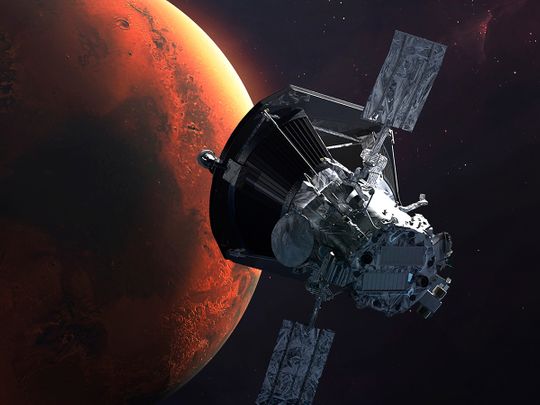
Why do scientists and astronomers insist on sending missions to that faraway red rock we all know as Mars?
Click start to play today’s Spell It, where you can find a ‘rover’ traversing across the planet’s barren landscape.
The answer to that question is tied to the quest for knowledge of ourselves and our entire universe. According to the European Space Agency’s website, one of the fundamental questions of humankind is whether life exists elsewhere in the universe, beyond Earth. The most natural place to start looking for answers is in Mars, since it’s the most similar planet to our own, in the solar system.
Mars isn’t completely unknown to us, either. According to American research group The Brookings Institution, Mars has been mapped and studied for several decades. Since it can be reached in just six and a half months, it provides a unique opportunity for scientists to bring samples back to Earth, where they can be analysed for evidence of microbial life.
As people like to say now and then, it’s not about the destination – the journey matters, too. The same notion holds for Mars. Because of the ambitious project of visiting the Red Planet, scientists have had to come up with unprecedented inventions and innovations. They figured out how to search for life in ancient rocks, drill for samples, take high-resolution images and videos, and develop aerial drones that can fly in a planet that has 40 per cent lower gravity than Earth – among other achievements.
That inventive spirit trickles down to consumers like us, as it has always done before. For instance, we owe at least part of the creation of global positioning systems (GPS), wireless technology and camera phones to US space agency National Aeronautics and Space Administration (Nasa), according to The Brookings Institute.
Even as Mars opens up the possibilities of space tourism, programs surrounding these projects are already improving engineering expertise here on Earth. New and enhanced ways to ensure seamless space docking, launches and re-entry are underway, and scientists are figuring out the effects of space travel on the human body. Space tourism is expected to broaden our horizons in more ways than one.
The more you think about that distant red rock, the more it becomes clear – the question shouldn’t be why we should go to Mars, but why shouldn’t we?
What do you think of human missions to Mars? Play today’s Spell It and tell us at games@gulfnews.com.









